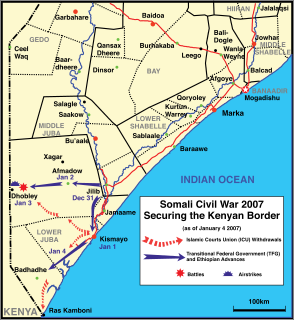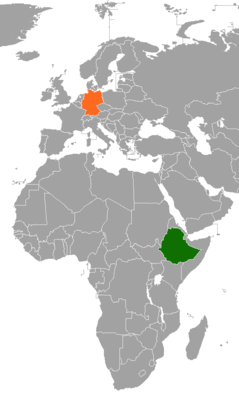| |||||
| Decades: | |||||
|---|---|---|---|---|---|
| See also: | Other events of 2007 Timeline of Ethiopian history | ||||
The following lists events that happened during 2007 in Ethiopia .
| |||||
| Decades: | |||||
|---|---|---|---|---|---|
| See also: | Other events of 2007 Timeline of Ethiopian history | ||||
The following lists events that happened during 2007 in Ethiopia .

Meles Zenawi Asres was an Ethiopian soldier and politician who served as President of Ethiopia from 1991 to 1995 and then Prime Minister of Ethiopia from 1995 until his death in 2012.

The Somalia War, also known as the Ethiopian invasion of Somalia or Ethiopian intervention in Somali Civil War was an armed conflict involving largely Ethiopian and Somali Transitional Federal Government (TFG) forces and Somali troops from Puntland versus the Somali Islamist umbrella group, the Islamic Court Union (ICU), and other affiliated militias for control of Somalia.

The Advance of the Islamic Courts Union is the period in the Somali Civil War that began in May 2006 with the Islamic Courts Union's (ICU) conquest of Mogadishu from the Alliance for the Restoration of Peace and Counter-Terrorism (ARPCT) and continued with further ICU expansion in the country. Following the outbreak of the war on December 21, 2006; by December 24, direct Ethiopian intervention in the conflict in support of the Transitional Federal Government (TFG) was no longer denied by the Ethiopian government. The Eritrean government denied any involvement despite Ethiopian claims to the contrary.
The Ethiopian–Somali conflict is a territorial and political dispute between the countries of Ethiopia and Somalia. Lasting from the late 1940s, when the Ogaden region was handed over to Ethiopia by the British, into the present day, the tensions culminated in three wars and numerous military clashes alongside the borders. However, because of the Somali Civil War and the lack of a functioning central government in Somalia since the collapse of the Democratic Republic of Somalia in 1991, Ethiopia has the upper hand militarily and economically.
The Battle of Baidoa began on 20 December 2006 when the Somali transitional federal government forces (TFG) allied with Ethiopian forces stationed there attacked advancing Islamic Courts Union (ICU) forces along with 500 alleged Eritrean troops and mujahideen arrayed against them.
The timeline of events in the War in Somalia during 2006 is set out below.

The timeline of events in the War in Somalia during 2007 is set out below.

The 2007–2008 Ethiopian crackdown in Ogaden was a military campaign by the Ethiopian Army against the Ogaden National Liberation Front (ONLF). The crackdown against the guerrillas began after they killed 74 people in an attack on a Chinese-run oil exploration field in April 2007.

The Insurgency in Ogaden was an armed conflict that took place from 1994 to 2018. It was fought by separatists, the Ogaden National Liberation Front (ONLF), against the Ethiopian government. The war began in 1994, when the ONLF tried to separate Ethiopia's Somali Region from Ethiopia. It ended in a peace agreement as part of Prime Minister Abiy Ahmed's reforms.

The 2009–present phase of the Somali Civil War is concentrated in southern and central Somalia and portions of north eastern Kenya. It began in early February 2009 with the conflict between the forces of the Federal Government of Somalia, assisted by African Union peacekeeping troops, and various militant groups and factions. The violence has displaced thousands of people in the southern part of the country. The civil war has also seen fighting between the Sufi Ahlu Sunna Waljama'a and al-Shabaab.
Ethiopian judicial authority v Swedish journalists 2011 was about the legal proceedings relating to claims that Swedish journalists Johan Persson and Martin Schibbye were supporting terrorism in Ethiopia. Relations between Sweden and Ethiopia were seriously affected by this case. In 2011, Ethiopia was claimed to detain more than 150 innocent people, including reporters. Johan Persson and Martin Schibbye were released in September 2012 as part of a mass pardon, and returned home to Sweden.
The following lists events that happened during 2006 in Ethiopia.
The following lists events that happened during 2009 in Ethiopia.
The following lists events that happened during 2012 in the Federal Democratic Republic of Ethiopia.
The following lists events that happened during 2005 in Ethiopia.
The following lists events that happened during 2003 in Ethiopia.
The following lists events that happened during 2001 in Ethiopia.

Ethiopia–Germany relations are bilateral relations between Ethiopia and Germany. Traditionally, they have closest diplomatic relations characterized by friendly relations. The two countries established their embassies on 7 March 1905, and in 1907 by order of Emperor Menelik II, the German embassy moved in the current site in Addis Ababa. Both enjoyed favored relations and visited each other's countries on numerous occasions. Germany has an embassy in Addis Ababa and Ethiopia has an embassy in Berlin.

The following events detail foreign affairs dominated by Ethiopian Prime Minister Meles Zenawi from his presidency until his death in 2012.
Ethiopia retains capital punishment while not ratified the Second Optional Protocol (ICCR) of UN General Assembly resolution. Historically, capital punishments was codified under Fetha Negest in order to fulfill societal desire. Death penalty can be applied through approval of the President, but executions are rare.